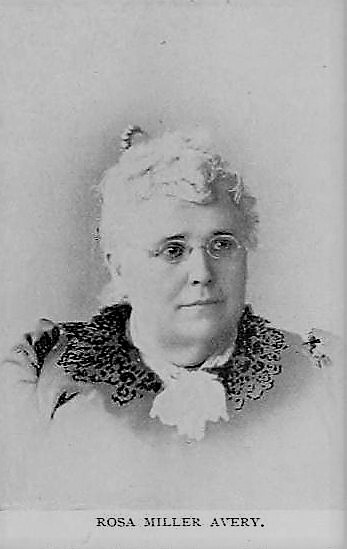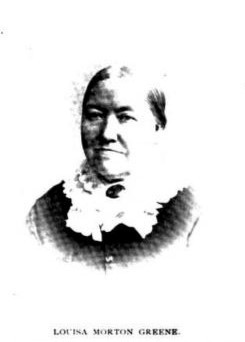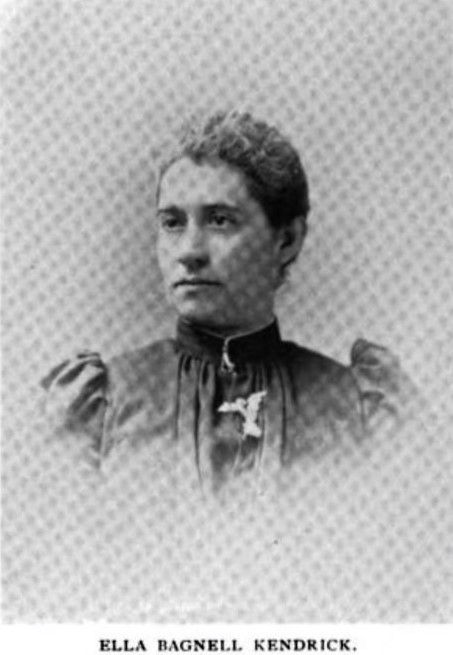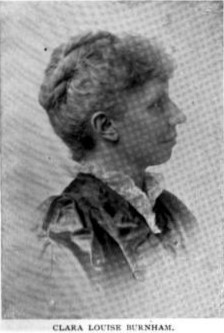May 21 - May 27
Women of the Week
Rosa Miller Avery, who was a reformer, Louisa Morton Greene, who was a reformer and author, Ella Bagnell Kendrick, who was a temperance, education, and women's rights reformer, as well as a journalist, and Clara Louise Burnham, whose writing career included novels, articles, and lyrics, celebrated birthdays during this week.
-
To learn about them by viewing their items, please click on their images.
-
To read their biographical sketches in A Woman of the Century, please click on the highlighted page number(s) to the left of their images.
Rosa Miller Avery was born in Madison, Ohio, on May 21, 1830. She married Cyrus Avery in 1853 and became the mother of Cyrus Miller Avery. Her family lived in Ashtabula, Ohio, Erie, Pennsylvania, and then Chicago, Illinois.
A passionate reformer, Rosa worked for Anti-Slavery, Prison Reform, and Women's Rights. On February 11, 1860, Rosa hosted the first meeting of the Ashtabula Ladies' Anti-Slavery Society and became its secretary and treasurer. She wrote an article about the Society's first Annual Meeting at Templars' Hall and the activities of its first year for the Ashtabula Weekly Telegraph. To bring attention to the cause during the Civil War, Rosa wrote articles under a male pseudonym. Later, she wrote in support of women's rights in the Chicago Inter-Ocean. Rosa was a member of the National Council of Women of the United States and the National American Woman Suffrage Association.
Rachel Foster Avery, a woman's rights advocate, was Rosa's daughter-in-law. Rosa's vast social network included Lydia Maria Child, James A. Garfield, and James Redpath.
Devoted to women's rights, Rosa even paid for her newborn granddaughter, Julia Foster Avery, to become a member of the National American Woman Suffrage Association. She passed away at "Rose Cottage," her home in Edgewater, Illinois, on November 9, 1894, and was buried in Middle Ridge Cemetery in Madison, Ohio. In March of 1895, Rosa and several other recently deceased members were honored at the annual meeting of the National Council of Women of the United States.
Louisa Morton Willard Greene was born in Ashburnham, Massachusetts, on May 23, 1819. She worked in a woolen mill in Dedham, Massachusetts, where she began writing, and later taught in Portsmouth, New Hampshire.
After marrying businessman and politician Jonas Greene in 1841, Louisa became the mother of a son, Jonas Willard Greene, who was stillborn, two younger sons, Willard Jonas Greene and George Henry Greene, and five daughters, Martha, Estelle, Christina, Wilma, and Charlena. The family lived in Peru, Maine.
Louisa was involved in many philanthropic and reform activities, including ministering to the sick using the Water Cure, and participating in philanthropy, anti-slavery reform, temperance reform, and suffrage efforts. She utilized her public speaking and journalistic talents on behalf of the causes she believed in.
Before the Civil War, Louisa wrote poetry, contributed articles to the Oxford Democrat, and led anti-slavery efforts in her area As her daughter Christina later remembered, Louisa was very active in the war effort: "During the civil war Mrs. Greene's patriotic labors were untiring. In addition to multitudinous home duties, which were always faithfully performed, she took upon herself the labor of collecting, preparing and forwarding hospital supplies for the boys at the front who were so dear to her heart."
In 1869, Louisa's family moved to Manassas, Virginia, residing at the home they named Birmingham. She became a widow four years later.
Louisa passed away in Washington, D.C. on March 5, 1900, and her ashes were buried in the family plot at St. Paul's Cemetery in Alexandria, Virginia. In addition to Christina's beautiful obituary, her daughter Estelle penned a farewell announcement and included a poem that she had written about her mother's passing. Within her tribute, Estelle included Louisa's motto: "Help for the living and hope for the dead."
At the National American Woman Suffrage Association Convention in February of 1902, it was announced that Louisa had bequeathed one humdred dollars to the organization.
Ella Bagnell Kendrick, a native of Plymouth, Massachusetts, graduated from Plymouth High School when she was just sixteen. After she married, she moved to Meriden, Connecticut and lived in that state for the rest of her life. Having a keen interest in science, she was very involved with the Meriden Scientific Association.
While her A Woman of the Century profile heading lists Ella as a temperance worker, she was involved in many activities and causes.
Just as she had worked with her husband's business when she lived in Meriden, Ella became associate editor of her husband's periodical, New England Home, when they settled in Hartford. She utilized her editorial experience in 1899 when she became editor of Talks and Tales, "a monthly magazine composed as to text and type entirely by the blind" (Evening Star, December 28, 1899).
An education advocate, Ella wrote to Woman's Journal in 1896 about the many Connecticut women involved on educational boards in the state.
Also a supporter of women's rights, she was an active member of the Equal Rights Association and was corresponding secretary of the Connecticut Woman's Suffrage Association. In 1896 and 1897, Ella was very involved with the movement by the Equal Rights Association to erect a statue in Hartford in honor of Harriet Beecher Stowe.
Her work for the temperance cause involved being a member of the Woman's Christian Temperance Union and a leader of the Prohibition Party in Meriden, New Haven, and Hartford. Ella spoke about temperance at the 1907 New Haven County W.C.T.U. meeting and about "Women As Citizens" at the 1922 meeting. In addition, she was Superintendent of the Demorest Medal Contests.
Ella combined her interests in women's rights and temperance by speaking on "How to Use the Ballot" at the W.C.T. U. Institute in June, 1916. The Norwich Bulletin reported: "She gave a most interesting talk, citing instances to show the way it has been used for good in many places."
She also joined with women of her Unitarian faith, being a member of the Connecticut Valley Associate Alliance of Unitarian Women and speaking at its 1922 conference.
As Ella's A Woman of the Century profile notes, "She is a woman of active habits and strong character, and she makes her influence felt in any cause that enlists her sympathies" (434).
Sometimes known as "Edith Douglas," Clara Louise wrote for Wide Awake early in her career. Her works also appeared in St. Nicholas and Youth's Companion.
Her early fiction from the 1880s was published by Chicago’s Henry A. Sumner and Company, while her later work was published by Houghton, Mifflin and Company of Boston and New York and by Grosset & Dunlap of New York. May O. Root, Clara Louise's sister, illustrated her 1884 novel Dearly Bought.
Literary World reviewed eight books by “Edith Douglas,” while Critic reviewed seven of her works. In addition, Clara Louise's books were noticed in Atheneum (London), Atlantic Monthly, Catholic World, Chautauquan, Dial, New Orleans Daily Picayune, and Overland Monthly.
While she lived in Chicago, Clara Louise spent the summer months at her home, the Moorings, on Bailey Island, Maine. In 1915, she hosted actor Robert Dempster, her collaborator on an upcoming novel, at the Moorings.
Female screen director Lois Weber adapted Jewel: A Chapter in Her Life, Clara Louise's 1903 Christian Science novel, as the film Jewel in 1915 and later as A Chapter in Her Life in 1923.
In 1926, Clara Louise was one of many women honored at a breakfast during the Woman's World Fair in Chicago. The next year, she was honored at a dinner by the Society of Midland Authors.
Clara Louise passed away on Monday, June 20, 1927, at the Moorings. She was buried in Harmony Vale Cemetery, North Reading, Massachusetts.




